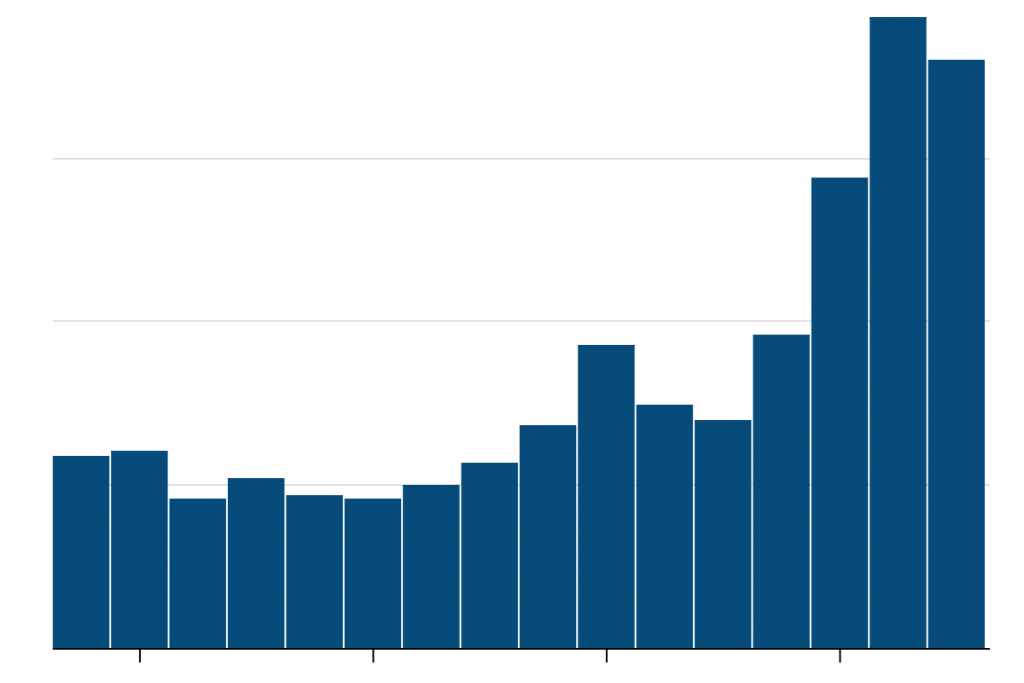Misinformation is maligning Facebook’s reputation in multitudinous ways.
In what seems like a sustained series of issues, engagement from misleading websites on Facebook has increased threefold since 2016 by a study published by the German Marshall Fund Digital, the digital wing of the Washington, DC-based public policy think tank.
This can be constituted as the latest claim to infamy for Facebook. The report found that the total number of user interactions with articles from deceptive outlets (that publish false or manipulated information) increased by a whopping 242% between the third quarter of 2016 and the third quarter of 2020.

Since the same third quarter of 2016, the number of articles from False Content Producers jumped by 102 percent and the number of articles from Manipulators increased by 293 percent.
Only 10 outlets, out of many a thousand, received 62% of those interactions, GMF Digital reported. The researchers in the study categorized outlets as either “False Content Producers” for sites that provide information that’s false, and “Manipulators” for sites, like Breitbart, that presented claims unsubstantiated by evidence.
Facebook’s attempts to arbitrate and intervene in culling misinformation on the platform has come into renewed focus ahead of the US presidential election.
2016 was a rather fateful year for the US. However, Judging by the way that Facebook has handled some of the factually incorrect posts of the sitting President Mr. Trump this year, it has indeed stirred nightmarish memories of 2016.
In April 2019, CEO Mark Zuckerberg himself testified before the Congress and apologised for making “a big mistake,” including exposing up to 87 million users’ data to Trump campaign consultants (a privacy breach for which Facebook was fined $5 billion); concealing an organized Russian effort to interfere in the 2016 election, and continually failing to regulate genocidal hate speech.
There are moves which reek of the past in election cycle ‘20 too. As reported by reputed news agency CNN last month, Facebook has, fortuitously or not, allowed political advertisers to target hundreds of misleading ads about Joe Biden and the US Postal Service to swing-state voters ranging from Florida to Wisconsin in recent weeks. This again, goes on to highlight an apparent failure to enforce its own rules, especially when it stands two months before Election Day.
The social media has been strongly called out in the past by civil rights leaders and users alike for ineffectual handling of proliferating hate speech and misinformation concerns on its platform.
When considering that the study found the number of interactions with manipulative outlets in the second quarter of 2020 alone was greater than the number of interactions in all of 2017, it is a grave phase indeed.
While acknowledging the concerning nature of the data found in the study, it also earnestly defended its continuing measures against such issues. An appointed spokesperson from Facebook was of the view that engagement doesn’t take into account what the majority of Facebook users actually see on the site, and shouldn’t reflect the progress Facebook has made in limiting misinformation since 2016.
Detailing further, the spokesperson elaborated that while the company has been active in setting up the largest fact-checking network of any platform, it has also made investments in highlighting original, informative reporting, and changed their products to ensure fewer people see false information and are made aware of it when they do.
Third-party fact-checkers are indeed responsible for verifying much of the content publishers post on Facebook, and are part of “a three-part approach” that Facebook takes in “addressing problematic content across” its apps, including Instagram and WhatsApp.
The Director of GMF Digital, also warned against the prevalent trend.
“Disinformation is infecting our democratic discourse at rates that threaten the long-term health of our democracy. A handful of sites masquerading as news outlets are spreading even more outright false and manipulative information than in the period around the 2016 election.”
With the mighty reach of the company, it should learn to shoulder responsibility. Rumormongering, enabling reckless distribution of partisan information is paranoia festering in the society lest stringent measures are taken to combat it. While Facebook strenuously defends its actions, it is also true that the responses indicate they are falling short and must do more.
The onus is on Facebook to show intent to quell misinformation.
Stay tuned for more updates.

